Fleurs du Mal Magazine


Or see the index
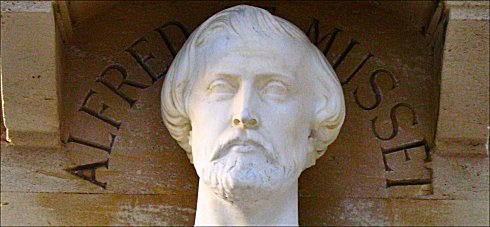
Alfred de Musset
(1810-1857)
Chanson: Lorsque la coquette Espérance…
Lorsque la coquette Espérance
Nous pousse le coude en passant,
Puis à tire-d’aile s’élance,
Et se retourne en souriant ;
Où va l’homme ? Où son coeur l’appelle.
L’hirondelle suit le zéphyr,
Et moins légère est l’hirondelle
Que l’homme qui suit son désir.
Ah ! fugitive enchanteresse,
Sais-tu seulement ton chemin ?
Faut-il donc que le vieux Destin
Ait une si jeune maîtresse !
Alfred de Musset poésie
kempis.nl poetry magazine
More in: Archive M-N, Musset, Alfred de
.jpg)
E u g e n e M a r a i s
(1871-1936)
D i e s t i l l e r u s p l a a s
Drie verse uit “Die Tuin van Proserpina”
Die Juigende, die Sterke –
Die dood sal hom ook raak;
Nooit sal hy vlieg met vlerke
Of pyn in vure smaak.
Die Skoonheid van die rose,
Die kom en gaan van blose
Stoor nooit die Liefdelose –
Waar liefde ons versaak.
Bevryd van dors na lewe,
Van al ons hoop en wee,
Dank ons – bo alle vrees verhewe –
Die gode wat dit gee:
Hier eindig al ons drome,
Hier rus die lewenslome,
Hier vloei die moegste strome
Uiteindelik in die see.
Nòg gloeiend’ son, nòg duister,
Nòg keer van aand en dag,
Nòg waters sag gefluister
Sal ooit die slaap verkrag.
En soeter, sagter, vromer,
Vergeefs kom weer die Somer,
Want droomloos is die Dromer,
Verdiep in ewig’ nag.
Eugene Marais Gedigte
fleursdumal.nl magazine
More in: Archive M-N, Eugène Marais, Marais, Eugène
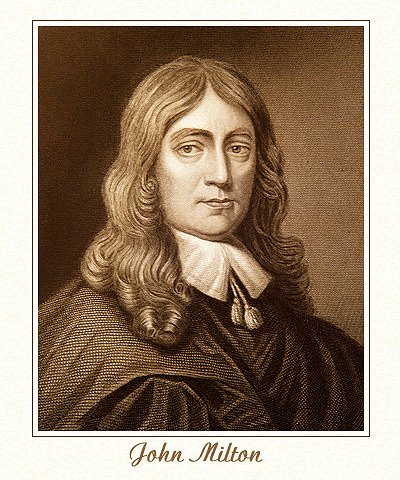
John Milton
(1608–1674)
Light
Hail holy light, ofspring of Heav’n first-born,
Or of th’ Eternal Coeternal beam
May I express thee unblam’d? since God is light,
And never but in unapproached light
Dwelt from Eternitie, dwelt then in thee,
Bright effluence of bright essence increate.
Or hear’st thou rather pure Ethereal stream,
Whose Fountain who shall tell? before the Sun,
Before the Heavens thou wert, and at the voice
Of God, as with a Mantle didst invest
The rising world of waters dark and deep,
Won from the void and formless infinite.
Thee I re-visit now with bolder wing,
Escap’t the Stygian Pool, though long detain’d
In that obscure sojourn, while in my flight
Through utter and through middle darkness borne
With other notes then to th’ Orphean Lyre
I sung of Chaos and Eternal Night,
Taught by the heav’nly Muse to venture down
The dark descent, and up to reascend,
Though hard and rare: thee I revisit safe,
And feel thy sovran vital Lamp; but thou
Revisit’st not these eyes, that rowle in vain
To find thy piercing ray, and find no dawn;
So thick a drop serene hath quencht thir Orbs,
Or dim suffusion veild. Yet not the more
Cease I to wander where the Muses haunt
Cleer Spring, or shadie Grove, or Sunnie Hill,
Smit with the love of sacred song; but chief
Thee Sion and the flowrie Brooks beneath
That wash thy hallowd feet, and warbling flow,
Nightly I visit: nor somtimes forget
Those other two equal’d with me in Fate,
So were I equal’d with them in renown.
Blind Thamyris and blind Maeonides,
And Tiresias and Phineus Prophets old.
Then feed on thoughts, that voluntarie move
Harmonious numbers; as the wakeful Bird
Sings darkling, and in shadiest Covert hid
Tunes her nocturnal Note. Thus with the Year
Seasons return, but not to me returns
Day, or the sweet approach of Ev’n or Morn,
Or sight of vernal bloom, or Summers Rose,
Or flocks, or herds, or human face divine;
But cloud in stead, and ever-during dark
Surrounds me, from the chearful waies of men
Cut off, and for the Book of knowledg fair
Presented with a Universal blanc
Of Natures works to mee expung’d and ras’d,
And wisdome at one entrance quite shut out.
So much the rather thou Celestial light
Shine inward, and the mind through all her powers
Irradiate, there plant eyes, all mist from thence
Purge and disperse, that I may see and tell
Of things invisible to mortal sight.
kempis.nl poetry magazine
More in: Archive M-N, Milton, John

Alfred de Musset
(1810-1857)
La Nuit de Décembre
Du temps que j’étais écolier,
Je restais un soir à veiller
Dans notre salle solitaire.
Devant ma table vint s’asseoir
Un pauvre enfant vêtu de noir,
Qui me ressemblait comme un frère.
Son visage était triste et beau :
À la lueur de mon flambeau,
Dans mon livre ouvert il vint lire.
Il pencha son front sur sa main,
Et resta jusqu’au lendemain,
Pensif, avec un doux sourire.
Comme j’allais avoir quinze ans
Je marchais un jour, à pas lents,
Dans un bois, sur une bruyère.
Au pied d’un arbre vint s’asseoir
Un jeune homme vêtu de noir,
Qui me ressemblait comme un frère.
Je lui demandai mon chemin ;
Il tenait un luth d’une main,
De l’autre un bouquet d’églantine.
Il me fit un salut d’ami,
Et, se détournant à demi,
Me montra du doigt la colline.
À l’âge où l’on croit à l’amour,
J’étais seul dans ma chambre un jour,
Pleurant ma première misère.
Au coin de mon feu vint s’asseoir
Un étranger vêtu de noir,
Qui me ressemblait comme un frère.
Il était morne et soucieux ;
D’une main il montrait les cieux,
Et de l’autre il tenait un glaive.
De ma peine il semblait souffrir,
Mais il ne poussa qu’un soupir,
Et s’évanouit comme un rêve.
À l’âge où l’on est libertin,
Pour boire un toast en un festin,
Un jour je soulevais mon verre.
En face de moi vint s’asseoir
Un convive vêtu de noir,
Qui me ressemblait comme un frère.
Il secouait sous son manteau
Un haillon de pourpre en lambeau,
Sur sa tête un myrte stérile.
Son bras maigre cherchait le mien,
Et mon verre, en touchant le sien,
Se brisa dans ma main débile.
Un an après, il était nuit ;
J’étais à genoux près du lit
Où venait de mourir mon père.
Au chevet du lit vint s’asseoir
Un orphelin vêtu de noir,
Qui me ressemblait comme un frère.
Ses yeux étaient noyés de pleurs ;
Comme les anges de douleurs,
Il était couronné d’épine ;
Son luth à terre était gisant,
Sa pourpre de couleur de sang,
Et son glaive dans sa poitrine.
[…]
kempis.nl # kempis poetry magazine
More in: Archive M-N, Musset, Alfred de
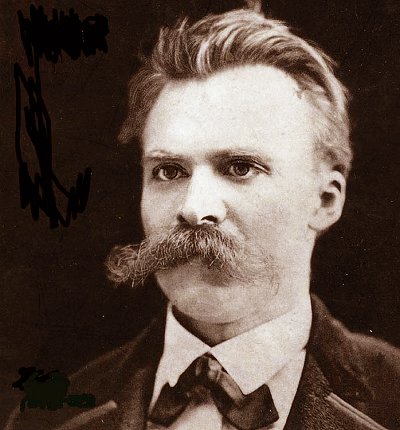
Friedrich Wilhelm Nietzsche
(1844-1900)
Idyllen aus Messina
Die kleine Hexe
So lang noch hübsch mein Leibchen,
Lohnt sichs schon, fromm zu sein.
Man weiss, Gott liebt die Weibchen,
Die hübschen obendrein.
Er wird’s dem art’gen Mönchlein
Gewisslich gern verzeihn,
Dass er, gleich manchem Mönchlein,
So gern will bei mir sein.
Kein grauer Kirchenvater!
Nein, jung noch und oft roth,
Oft gleich dem grausten Kater
Voll Eifersucht und Noth!
Ich liebe nicht die Greise,
Er liebt die Alten nicht:
Wie wunderlich und weise
Hat Gott dies eingericht!
Die Kirche weiss zu leben,
Sie prüft Herz und Gesicht.
Stäts will sie mir vergeben: –
Ja wer vergiebt mir nicht!
Man lispelt mit dem Mündchen,
Man knixt und geht hinaus
Und mit dem neuen Sündchen
Löscht man das alte aus.
Gelobt sei Gott auf Erden,
Der hübsche Mädchen liebt
Und derlei Herzbeschwerden
Sich selber gern vergiebt!
So lang noch hübsch mein Leibchen,
Lohnt sich’s schon, fromm zu sein:
Als altes Wackelweibchen
Mag mich der Teufel frein!
kempis.nl # kempis poetry magazine
More in: Archive M-N, Friedrich Nietzsche, Nietzsche
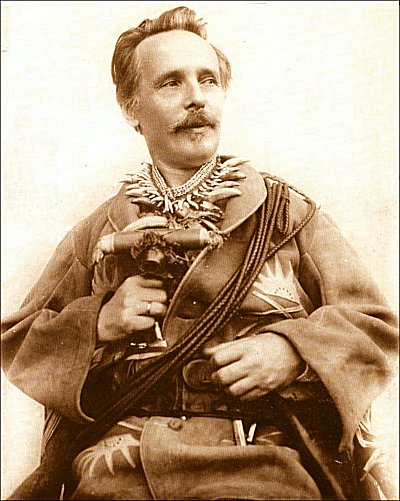
Karl May
(1842-1912)
Die wilde Rose
Es glänzt der helle Thränenthau
In Deinem Kelch, dem todesmatten;
Du sehnst Dich nach des Himmels Blau
Hinaus aus düstrem Waldesschatten.
Es rauscht der Bach am Felsenspalt
Sein melancholisch Lied.
Hier ists so eng, hier ists so kalt,
Wo nie der Nebel flieht.
Du meine süße Himmelslust,
O traure nicht und laß das Weinen!
Dir soll ja stets an treuer Brust
Die Sonne meiner Liebe scheinen.
Drum schließe Deine Augen zu,
Worin die Thränen glühn.
Ja, meine wilde Rose, Du
Sollst nicht im Wald verblühn!
Karl May Gedicht: Die wilde Rose
• fleursdumal.nl magazine
More in: Archive M-N, Archive M-N, Karl May
.jpg)
E u g e n e M a r a i s
(1871-1936)
M a b a l ê l
Vinnig langs die paadjie trippel Mabalêl;
vrolik klink die liedjie
wat die klingelinge van haar enkelringe vergesel.
Op die voetpad sy alleen,
met die skadu’s om haar heen;
op haar kop die kruik gelig
in gedienstig’ ewewig.
Golwend kleur die hemelboog,
stadig sterf die laaste lig,
en van verre deur die skermmure
winkend blink die eerste vure.
Wydgestrek in eensaam’ vrede
lê Rakwen’, die stille, brede;
glansend in die westerpraal,
met ‘n ceintuur in sy diepte van koraal.
En die witgepluimde riet
sing ‘n treurig’ wiegelied,
en buigend vleg ‘n wilwersoom al om
die diepgespieëlde hemelkom.
Wag, wag, Mabelêl!
Is daar niks wat jou vertel-
is daar niks wat deur die duister
bang en dringend in jou ore fluister
van die vreeslike gesel
wat jou vrolik’ lied beluister,
wat jou spoor hou, Mabalêl?
Word jy niks gewaar
van ‘n dreigende gevaar?
Voel jy nog nie, kil en snood,
Om jou hart die skadu van die dood?
Ver benee die palmietstele
in die bloue duister wag Lalele,
kwintessens van alles boos,
die Wreedheid self, meedoënloos;
met lydsaamheid wat alles kan ontbeer,
wat tyd en toeval kan trotseer;
wat seker as die Noodlot van sy dag
stil-wakker in die diepte op sy ure wag.
Deur winterkou en somergloed,
deur blankend’ droogte en swelgend’ vloed,
deur al die kerende taf’rele,
in sy diepte wag Lalele.
As die straaltjie in die sand
deur ‘n vlam-geskroeide land
tussen walle dor en vaal
skaars die rotse van Rakwena haal,
en die hulsels van die riet
‘n rouband bind van swart verdriet
om die groenbedekte kuil
waar die laaste water skuil
en die sugtend’ wind versmag
deur ‘n woedend’ son verkrag, –
roerloos by die skepplek hou Lalele wag!
En wanneer in donker nagte
rasend losbreek al die magte
van geweld en storm en vloed,
en Rakwen’ omring van angsgeskreeu,
smagtend sig nog eens te wreek,
soos ‘n swaar gekweste leeu
swart en brullend deur die bome breek; –
blinkend uit die donker kolk, –
vlieg ‘n vlammend’ dolk, –
wat deur stormbanke dig
‘n wêreld van verwoeste loof verlig –
ongeroer deur al die groot krakele
in sy diepte wag Lalele!
Droom sy op die kantjie, Mabalêl,
tot haar hart verlangend swel;
in haar peinse ongedeer,
staar sy in die diepte neer,
staar sy in die spieëlgewelf
met die donker reeds omsoom –
tot sy, dromend, self
deel word van ‘n salig’ droom;
uit die wêreld omgekeer
lokkend lag haar beeldjie weer.
Stadig deur die rietpensele
opwaarts uit die diepte rys Lalele.
Skud jou wakker, Mabalêl!
Sien jy nie die skadu opwaarts wel?
Naar die hoogwal, Mabalêl!
Hou jou mymering vir later –
nooit had vyg of wilg in water
so ‘n gespieëlde metgesel!
Nooit ‘n skrikbeeld uit die holte van die nag,
wat die dromer sug doen na die dag;
nooit onheilige gedaante uit die diepte van die hel
half so dreigend, half so fel
as dié skadu, Mabalêl,
as dié skadu, wat benee jou
uit die diepte opwaarts wel.
Voor jou voete, Mabalêl,
deur die westergloor verhel,
waar jy onbedagsaam staar,
sonder ooit gedagte van gevaar,
uit die stroomweg stadig
dryf ‘n halfverdrinkte blaar.
Had jy spiere van ‘n tier,
of die vlerke van ‘n gier,
meidjie, niks sou dit jou baar,
want te lank het jy gewag – te laat!
Uit die spieëlvlak omhoog
bars ‘n skuimend’ waterboog;
Oor Rakwena, kalm en breed,
Galm ‘n enkel angsvol’ kreet;
en dan saggies weer
oor alles sak die stilte neer.
Winkend deur die skermmure
helder blink die voornagvure.
Uit die donker stilte, skel,
klink geroep na Mabalêl
en die rotse antwoord weer;
maar terugkom sal sy … nimmermeer.
Stadig deur die rietpensele
naar die diepte sak Lalele.
E u g e n e M a r a i s p o e t r y
fleursdumal.nl magazine
More in: Archive M-N, Eugène Marais, Marais, Eugène
.jpg)
E u g e n e M a r a i s
(1871-1936)
D i e O o r w i n n a a r s
By die kindergrafte uit die Konsentrasiekamp van Nylstroom
Oorwinnaars vir ons volk,
bly u vir al wat beste in ons is ‘n ewig’ tolk;
nooit weer sal vyandsvoet u stof so diep vertrap en smoor
dat ons u langer nie kan sien – en hoor.
Nie onse Helde, wat die magtig’ leër
op glansryk’ velde kon weerstaan en keer;
nie onse Seuns, wat aan die galg en teen die muur
die diepe liefde vir hul eie moes verduur;
nie onse Moeders, wat met bloeiend hart en seer,
in swart Getsemane die ware smart moes leer;
nie onse Generaals, vereer met krans en riddersnoer;
– was waardig vir ons volk die hoë stryd te voer
en te oorwin.
Nie ons, met vuile hand en hart ontrou was waardig
om die vaandel hoog te hou.
Maar u, o bleke spokies, in U kermend’, klagend’ wee,
staan voor ons ewiglik beskermend – uit die lang verlee.
E u g e n e M a r a i s p o e t r y
fleursdumal.nl m a g a z i n e
More in: Archive M-N, Eugène Marais, Marais, Eugène
![]()
Jose Marti
(1853-1895)
Pour Out Your Sorrows
My Heart (Verse XLVI)
Pour out your sorrows, my heart,
But let none discover where;
For my pride makes me forbear
My heart’s sorrows to impart.
I love you, Verse, my friend true,
Because when in pieces torn
My heart’s too burdened, you’ve borne
All my sorrows upon you.
For me you suffer and bear
Upon your amorous lap
Every anguish, every slap
That my painful love leaves there.
That I may love, in peace with all,
And do good works, as my goal,
You thrash your waves, rise and fall,
With whatever weighs my soul.
That I may cross with fierce stride,
Pure and without hate, this vale,
You drag yourself, hard and pale,
The loving friend at my side.
And so my life its way will wend
To the sky serene and pure,
While you my sorrows endure
And with divine patience tend.
Because I know this cruel habit
Of throwing myself on you
Upsets your harmony true
And tries your gentle spirit;
Because on your breast I’ve shed
All of my sorrows and torments,
And have whipped your quiet currents,
Which are here white and there red,
And then pale as death become,
At once roaring and attacking,
And then beneath the weight cracking
Of pain it can’t overcome: —
Should I the advice have taken
Of a heart so misbegotten,
Would have me leave you forgotten
Who never me has forsaken?
Verse, there’s a God, they aver
To whom the dying appealed;
Verse, as one our fates our sealed:
We are damned or saved together!
Vierte Corazón tu pena
(Verso XLVI)
Vierte, corazón, tu pena
Donde no se llegue a ver,
Por soberbia, y por no ser
Motivo de pena ajena.
Yo te quiero, verso amigo,
Porque cuando siento el pecho
Ya muy cargado y deshecho,
Parto la carga contigo.
Tú me sufres, tú aposentas
En tu regazo amoroso,
Todo mi amor doloroso,
Todas mis ansias y afrentas.
Tú, porque yo pueda en calma
Amar y hacer bien, consientes
En enturbiar tus corrientes
Con cuanto me agobia el alma.
Tú, porque yo cruce fiero
La tierra, y sin odio, y puro,
Te arrastras, pálido y duro,
Mi amoroso compañero.
Mi vida así se encamina
Al cielo limpia y serena,
Y tú me cargas mi pena
Con tu paciencia divina.
Y porque mi cruel costumbre
De echarme en ti te desvía
De su dichosa armonía
Y natural mansedumbre;
Porque mis penas arrojo
Sobre tu seno, y lo azotan,
Y tu corriente alborotan,
Y acá lívido, allá rojo,
Blanco allá como la muerte,
Ora arremetes y ruges,
Ora con el peso crujes
De un dolor más que tú fuerte,
¿Habré, como me aconseja
Un corazón mal nacido,
De dejar en el olvido
A aquel que nunca me deja?
¡Verso, nos hablan de un Dios
Adonde van los difuntos:
Verso, o nos condenan juntos,
O nos salvamos los dos!
Jose Marti poetry
kempis poetry magazine
More in: Archive M-N
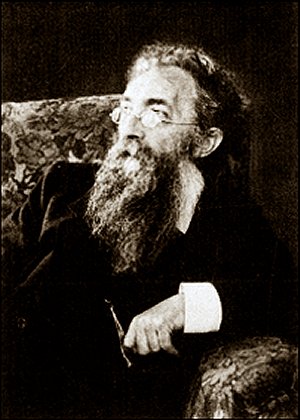
J.A. dèr Mouw
(1863-1919)
‘k Zie nu al hoe ‘k, als jij gestorven bent
‘K zie nu al hoe ‘k, als jij gestorven bent,
Zal zitten, kijkend naar je stil gezicht;
Wel vol verleden, toch pijnlijk verlicht,
Dat jij ten minste geen verdriet meer kent.
Mijn handen zullen, vroeger lang gewend,
Van zelf aaien je haar, waar levend ligt,
Als vroeger, nog het diep glanzende licht,
Dat uit de dood mij jouw vergeving zendt.
‘T is alles tevergeefs: nu weet ik al,
Dat ‘k dan, mijn hartje, niet begrijpen zal,
Hoe ‘k jou geen liefde gaf, mijzelf geen rust;
Zelfkwellend zal ‘k je, herrezen, zien staan,
Jong, als toen ik ‘t geluk voorbij liet gaan,
Die ene nacht. toen ‘k je niet heb gekust.
J.A. dèr Mouw gedicht
kempis poetry magazine

More in: Archive M-N

Christian Morgenstern
(1871-1914)
Der zertrümmerte Spiegel
Am Himmel steht ein Spiegel, riesengroß.
Ein Wunderland, im klarsten Sonnenlichte,
entwächst berückend dem kristallnen Schoß.
Um bunter Tempel marmorne Gedichte
ergrünt geheimnisvoller Haine Kranz;
der Seen Silber dunkle Kähne spalten,
und wallender Gewänder heller Glanz
verrät dem Auge wandelnde Gestalten.
Wohl kenn ich dich, du seliges Gefild! . .
Doch was in heitrer Ruh erglänzt dort oben,
ist mehr als dein getreues Spiegelbild,
ist Irdisches zu Göttlichem erhoben.
Du zeigst ein friedsam wolkenloses Glück,
um das umsonst die Staubgebornen werben . . .
Und doch! Auch du bist nur ein Schemenstück!
Ein Hauch -: Du schläfst im Grund in tausend Scherben.
Ein Hauch! . . Von düstren Wolken löst ein Flug
sich von der Felskluft Schautribünenstufen.
Um meinen Gipfel streift ihr dumpfer Zug,
als hätte sie mein fürchtend Herz gerufen.
Hinunter weist beschwörend meine Hand,
indes mein Aug nach oben bittet «Bleibe!»
Umsonst! Ein Stoß zermalmt des Spiegels Rand,
und donnernd bäumt sich die gewaltige Scheibe
und stürzt, von tausend Sprüngen überzackt,
mit fürchterlichem Tosen in die Tiefen.
Der Abgrund schreit, von wildem Graun gepackt.
Blutüberströmt die Wolken talwärts triefen.
Fahlgrüner Splitterregen spritzt umher,
den Leib der Nacht zerschneidend und zerfleischend.
Mordbrüllend wühlt der Sturm im Nebelmeer
und heult in jede Höhle, wollustkreischend.
Der Berge Adern schwellen, brechen auf
und schäumen graue Fülle ins Geklüfte.
Ihr Flutsturz reißt verstreuter Scherben Hauf
unhemmbar mit in finstre Waldnachtgrüfte.
Es wogt der Forsten nasses Kronenhaar,
durchblendet von demantnem Pfeilgewimmel . .
Doch um die Höhen wird es langsam klar,
durch Tränen lächelt der beraubte Himmel.
Und bald verblitzt der letzten Scherbe Schein,
zum Grund gefegt vom Sturm- und Wellentanze.
Nur feiner Glasstaub deckt noch Baum und Stein
und funkelt tausendfach im Sonnenglanze . . .
Ich schau, ich sinne, hab der Zeit nicht acht -:
Den Tag verscheuchte längst der Schattenriese.
Und aus der Tiefe predigen durch die Nacht
die Fälle vom versunknen Paradiese.
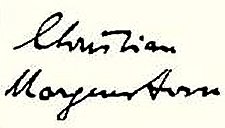
Christian Morgenstern poetry
kempis poetry magazine
More in: Archive M-N, Archive M-N, Christian Morgenstern, Morgenstern, Christian
.jpg)
Eugene Marais
(1871-1936)
D i e p R i v i e r
Vertaling van die lied van Juanita Perreira
O, Diep Rivier, O Donker Stroom,
Hoe lank het ek gewag, hoe lank gedroom,
Die lem van liefde wroegend in my hart?
– In jou omhelsing eindig al my smart;
Blus uit, O Diep Rivier, die vlam van haat; –
Die groot verlange wat my nooit verlaat.
Ek sien van ver die glans van staal en goud,
Ek hoor die sag gedruis van waters diep en koud;
Ek hoor jou stem as fluistering in ’n droom,
Kom snel, O Diep Rivier, O Donker Stroom.
Eugene Marais poetry
fleursdumal.nl magazine
More in: Archive M-N, Eugène Marais, Marais, Eugène
Thank you for reading Fleurs du Mal - magazine for art & literature